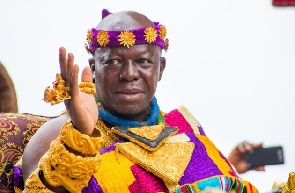 Otumfour Osei Tutu II, king of the Ashantis
Otumfour Osei Tutu II, king of the Ashantis
In October 2017, an employee of the Ghana International Bank plc in the UK was dismissed for allegedly failing to follow anti-money laundering policies.
Report by UK's Telegraph and Daily Mail stated that Otumfuo handed £350,000 cash to a banker Mark Arthur to be deposited on his behalf at the Ghana International Bank in the UK.
According to Mr Arthur, after receiving the cash from Otumfuo, he took an Uber taxi to Ghana International Bank’s city offices to deposit the money in Otumfuo’s account.
He explained that Otumfuo Osei Tutu II told him the cash had been withdrawn from banks in Ghana and brought to the UK and instructed him to move $200,000 to an account at Standard bank in Jersey.
In his witness statement to a tribunal hearing, Mark Arthur, a British-Ghanaian who lost his job as result of the money laundering case, claimed that the Otumfuo invited him to his multimillion-pound sterling residence in Henley-on-Thames and handed him a bag containing almost £200,000 as well as $200,000 with consecutive serial numbers.
The Asantehene, Otumfuo Osei Tutu II, while on a visit in the UK in 2017, was reported to have laundered £350,000. The Manhyia Palace refuted the claim stating that the report was inaccurate and inconsistent.
Mr Arthur contested his dismissal after reportedly receiving £350,000 cash from the Asantehene Otumuor Osei Tutu II, without following anti-money laundering regulations.
The case sparked a huge storm in Ghana with some accusing Otumfuo of engaging in money laundering, but the Tribunal in a unanimous decision dismissed the case.
Read the full story originally published on October 11, 2017 on GhanaWeb
A cash deposit in a London bank on behalf of Asantehene, Otumfuo Osei Tutu II has resulted in the dismissal of a bank employee for allegedly failing to follow anti-money laundering policies.
In his witness statement to a tribunal hearing, Mark Arthur, a British-Ghanaian who lost his job as result of the money laundering case, claimed that the Otumfuo invited him to his multimillion-pound sterling residence in Henley-on-Thames and handed him a bag containing almost £200,000 as well as $200,000 with consecutive serial numbers.
According to Mr. Arthur, after receiving the cash, he took an Uber taxi to Ghana International Bank’s city offices to deposit the money in Otumfuo’s account.
He explained that Otumfuo Osei Tutu II told him the cash had been withdrawn from banks in Ghana and brought to the UK and instructed him to move $200,000 to an account at Standard bank in Jersey.
However, after the deposit of the £350,000 at the Ghana International Bank, a money laundering alert was triggered, leading to Mr. Arthur’s suspension and subsequent dismissal as executive director of the bank following an investigation by audit firm, Grant Thornton.
According to the investigation, Mark Arthur failed to follow anti-money laundering rules and had violated security policies as it was only insured to carry cash by armoured car up to a maximum of £250,000.
Mr. Arthur who is seeking justice for wrongful dismissal and failure on the part of the bank to protect a whistleblower said he was unable to follow anti-money laundering rules when he accepted the cash because of the king's status.
He alleged that the deposit and transfer were approved by Ghana International Bank’s Chief Executive, Joseph Mensah, and an allegation which was flatly denied by the latter who claimed he “didn’t even have the authority to sanction such a huge amount”.
Mr. Arthur, in his witness statement to an employment tribunal said, “Without a policy to follow and did without wishing to offend a sovereign of my country, I found myself in a very difficult situation and one I had never been in before.”
He added, “I could not carry out the necessary due diligence by talking to his Majesty so decided it would be best to verify the deposits at the bank and to speak directly to Mr. Mensah rather than disrespect His Majesty in a face-to-face meeting”.
Background
Mr. Arthur was sacked by Ghana International Bank after the bank he transferred the money to in Jersey reported the transactions to the National Crime Agency as suspicious.
News of Mr. Arthur’s suspension was subsequently passed to the City watchdogs, the Prudential Regulation Authority and the Financial Conduct Authority (FCA). The FCA sent inspectors into the bank who severely criticised its handling of cash, the tribunal heard.
Lawyers for Mr Arthur argued that his handling of the deposit was in line with the way the bank previously handled Otumfuo’s account and that he was aware that the king could travel on a diplomatic passport.
Otumfuo Osei Tutu who remains one of the most influential traditional rulers in Ghana once worked at Brent council in the UK and holds a diplomatic passport, as part of his status as a traditional ruler.
They cited a string of large cash deposits in 2013 and 2014 where the source of the funds was not properly recorded.
They included a $100,000 that a review of Otumfuo’s account came from a fundraising event, but there were no documents recording the source of that cash.
Colin Millar, a building society chairman drafted in by Ghana International Bank to adjudicate on Mr. Arthur’s appeal against his dismissal, rejected suggestions that the £350,000 was acceptable because of Otumfuo’s history with the bank.
He told the tribunal the deposit and swift transfer offshore was a “classic” warning sign of money laundering.
“If you want to hide the sources of funds that are from a disreputable source then you move them around until it reaches the point where the authorities can’t trace them back to their original source. That’s a way of hiding the proceeds of crime”, Mr Millar told the hearing.”, Mr Millar told the hearing.